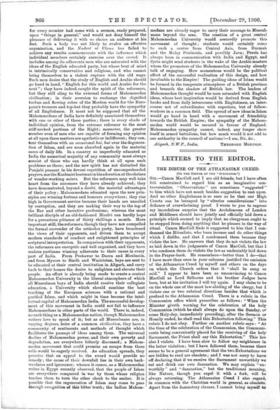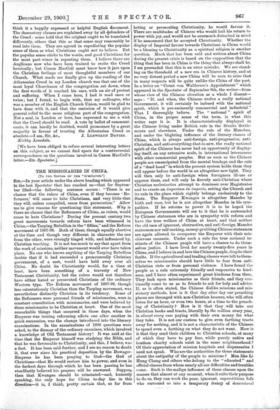LETTERS TO THE EDITOR.
THE DISUSE OF THE ATHANASIAN CREED.
(To THB EDITOR OF THE "SPECTATOR."] SIR,—Canon Ma.cColl and I are old friends, but I have often felt constrained to regard him as an imaginative con- troversialist. " Observations " are sometimes " suggested " to him which have not much besides suggestion to rest upon. And no other Englishman is so sure as he that our High Courts can be betrayed by "ulterior considerations" into defiance of overwhelming proof. I wrote to you to express my incredulous surprise that the Archdeacons of London and Middlesex should have jointly and officially laid down a principle which seemed to imply that no clergyman ought to be stopped from doing anything that he pleases in the way of ritual. Canon MacColl finds it suggested to him that I con- demned the Ritualists, who burn incense and do other things which I dislike, and that I condemned them because they violate the law. He answers that they do not violate the law as laid down in the judgments of Canon MacColl, but that I who condemn them do violate the law as undeniably laid down in the Prayer-book. He remembers—better than I do—that I have more than once in your columns justified the omission of the Athanasian Creed by myself and others on the days on which the Church orders that it "shall be sung or said." I appear to have been as unconvincing to Canon Ma.cColl as Lord Selborne and his brother Judges have been, but at his invitation I will try again. I may claim to be on the whole one of the most law-abiding of the clergy, but I violate one or two rubrical directions besides that which is prefixed to the Athanasian Creed. There is a rubric in the Communion office which prescribes as follows: "When the Minister giveth warning for the celebration of the holy Communion (which he shall always do upon the Sunday, or some Holy-day, immediately preceding), after the Sermon or Homily ended, he shall read this Exhortation following." This rubric I do not obey. Further on another rubric says : "At the time of the celebration of the Communion, the Communi- cants being conveniently placed for the receiving of the holy Sacrament, the Priest shall say this Exhortation." This law also I violate. I have been slow to follow my neighbours in the latter violation; but I have followed them, because there seems to be a general agreement that the two Exhortations we are bidden to read are obsolete ; and I was not sorry to leave off declaring that if we receive the Sacrament unworthily we eat and drink our own damnation. We may explain " un- worthily " and "damnation," but the traditional meaning, like Nature, though you expel it with a fork, will be always returning. The Athanasian Creed I also regard, in common with the Christian world in general, as obsolete. Apart from the damnatory clauses, I cannot bring myself -to
think it a happily expressed or helpful English document. The damnatory clauses are explained away by all defenders of the Creed : some hold that the original ought to be translated differently, others that this or that sense may reasonably be read into them. They are agreed in repudiating the popular sense of them as what Christians ought not to believe. But the popular sense sticks to the words, and good Christians for the most part wince in repeating them. I believe there are Anglicans now who have been trained to recite the Creed heroically; but Canon MacColl must know how it jars upon the Christian feelings of most thoughtful members of our Church. What made me finally give up the reading of the Athanasian Creed in my London church was that one of the most loyal Churchmen of the congregation sat down, when the first words of it reached his ears, with an air of protest and suffering. When I came here, I had it read once or twice ; but I found, to begin with, that my colleague, who was a member of the English Church Union, would be glad to have done with it, and that the omission of it would give general relief to the more religious part of the congregation. Not a soul, in London or here, has expressed to me a wish that the Creed should be read. A vote by ballot of communi- cants, it can hardly be doubted, would pronounce by a great majority in favour of treating the Athanasian Creed as [We have been obliged to refuse several interesting letters on this subject, as we cannot find space for a controversial correspondence on the questions involved in Canon MacColl's letter.—ED. Spectator.]



































 Previous page
Previous page